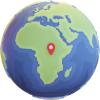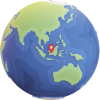Case studies are organised by region, with each region featuring links to the countries where the case studies are located.
Madagascar

The Verité report on coffee in Africa examines the challenges and issues within the coffee supply chain, focusing on labour rights and social responsibility. It highlights widespread issues such as child labour, forced labour, and poor working conditions among coffee workers across several African countries. These problems are exacerbated by factors like poverty, lack of education, and inadequate labour protections. The report identifies key areas for improvement, including enhancing transparency and accountability throughout the supply chain, strengthening labor laws and enforcement mechanisms, and promoting responsible sourcing practices among coffee buyers and exporters.
Verité calls for concerted efforts to address systemic issues in the coffee sector, ensuring that economic growth benefits all stakeholders fairly and sustainably.
Keywords: Sub-Saharan Africa, Madagascar, coffee, primary production, labour rights violations, child labour, foced labour
Source: https://verite.org/africa/explore-by-commodity/coffee/

According to Sky News, extensive illegal mining has transformed the shores of Lake Alaotra, in northern central Madagascar. The forest that once covered this area has been almost entirely replaced by mining shafts and mounds of rubble. Searching for precious gems, thousands of workers have settled in the area, and work in dangerous conditions to fight their economic situations, often defined by extreme poverty. The United Nations has warned that Madagascar is on the brink of the world's first climate-induced famine, with failed crops and dried rivers leading to widespread hunger. In addition, the conditions miners work in are highly dangerous. Safety measures and the equipment used are inadequate, creating hazardous conditions. Despite Madagascar's government signing agreements to stop deforestation, the implementation on the ground remains weak. The island, rich in natural resources like beryl, rubies, and sapphires, remains one of the poorest countries globally.
Keywords: Sub-Saharan Africa, Madagascar, minerals, primary production, illegal mining, human rights violations, labour rights violations
Sources: https://news.sky.com/story/climate-change-the-desperate-people-risking-their-lives-in-illegal-mines-that-are-destroying-madagascars-habitat-12466112
https://news.sky.com/video/madagascars-illegal-mines-12466286#:~:text=Illegal%20mining%20has%20devastated%20the,way%20to%20make%20a%20living.&text=Desperate%20Madagascar%20miners%20spend%20months,gems%20to%20feed%20their%20families

Madagascar has made significant strides in combating child labour, particularly in mica mining, where around 10,000 children are involved. Through the U.S. Department of Labor's “Combating Child Labour in Madagascar’s Mica-Producing Communities” project, the country has implemented effective interventions to address this issue. These efforts focus on improving educational opportunities, enhancing community awareness, and promoting better working conditions.
Key achievements include the establishment of child protection committees, community schools, and vocational training programs that offer alternatives to child labor. The project has also provided school kits and financial support to families, helping reduce the economic need for child labor. Moreover, collaboration with local authorities and stakeholders has strengthened the enforcement of labour laws and improved the monitoring of mica production sites. These comprehensive measures contribute to reducing child labour and fostering safer, more sustainable mica production practices.
Keywords: Sub-Saharan Africa, Madagascar, minerals, primary production, child labour, labour rights violations
Source: https://www.dol.gov/agencies/ilab/madagascar-shines-reducing-child-labor-mica-producing-communities-madagascar#:~:text=An%20estimated%2010%2C000%20children%20work,widespread%20labor%20exploitation%20of%20children

Despite international trade restrictions, illegally sourced Madagascar rosewood is being trafficked into Kenya. In one case from 2014, 34 containers of timber arrived at the Kenyan port of Mombasa from Madagascar heading to Hong Kong. While the timber arrived with a Certificate of Origin issued by the Madagascar Ministry of Forestry and Environment certifying the shipment as ordinary timber, the Kenyan Wildlife Service suspected the shipment contained Malagasy rosewood, namely Dalbergia – a protected species regulated by international trade.
Since the 1990s, the species has been threatened due to unsustainable exploitation of the wood. The production of high-quality items such as furniture and musical instruments has led to increased consumer demand for Malagasy rosewood, particularly in China. Due to this, Madagascar made all trade in rosewood illegal in 2010, and the wood is listed on the CITES (the global convention which governs the legality of international wildlife trade), meaning the wood can only be traded with a special permit.
Keywords: Sub-Saharan Africa, Madagascar, timber, primary production, trade and transport, illegal timber trade, fraudulent documentation, illegal logging
Source: https://www.traffic.org/views/bringing-mis-certified-timber-out-of-the-woodwork-a-malagasy-rosewood-court-case-review/


The Environmental Crimes Financial Toolkit is developed by WWF and Themis, with support from the Climate Solutions Partnership (CSP). The CSP is a philanthropic collaboration between HSBC, WRI and WWF, with a global network of local partners, aiming at scaling up innovative nature-based solutions, and supporting the transition of the energy sector to renewables in Asia, by combining our resources, knowledge, and insight.


